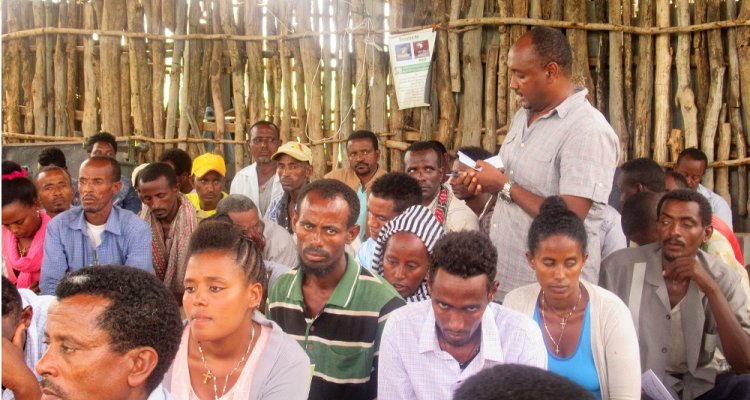
Client testimonial
"Together, we adopt a more inclusive way of doing agribusiness"
The Sesame Business Network aims to change the sesame sector in Ethiopia. "Wageningen Centre for Development Innovation has contributed to a change in culture, towards a more inclusive approach that puts farmers first", says Assistant Manager Anteneh Mekuria Tesfaye.
"Together, we are changing the culture here. We are here to facilitate change in the sector."
The Sesame Business Network (SBN) is a largely informal network driven by sesame farmers and other stakeholders in the sesame sector in North West Ethiopia. Since 2013 the network has been supported by Wageningen Centre for Development Innovation, financed by the Embassy of the Kingdom of the Netherlands in Ethiopia. The project falls under the umbrella of the BENEFIT programme. The aim of BENEFIT-SBN is to raise the income of sesame farmers, through production cost reduction, product and market development, and by strengthening the enabling environment for the Ethiopian sesame sector.
"The Sesame Business network is a bottom-up project. We organise workshops and facilitate meetings and listen to farmers. Together with stakeholders we aim to improve the way in which the agribusiness sector functions", says Anteneh Tesfaye. Tesfaye is Assistant Manager of BENEFIT-SBN and responsible for the day-to-day coordination of the project in Gondar. In addition, Tesfaye is Communication, Extension and Training Coordinator for BENEFIT-SBN, and helped develop an easy-to-read booklet entitled '20 Important Steps to Double Yield and Improve Quality of Sesame'.
Impact: outreach and guarantee fund
The latter was one of the main outcomes so far, according to Tesfaye. The booklet was accompanied by training courses, posters, radio programmes and short films that farmers could watch in mobile cinemas. In this way more than a hundred thousand farmers were informed and trained, who, by adopting recommended practices, could double their yields. Another major achievement is the improved access to finance for farmers, for whom the issue of lack of access to finance is the number one challenge, Tesfaye says. Loans are needed to buy inputs or invest in marketing, but informal money lenders are asking extremely high interest rates. Through a guarantee fund, BENEFIT-SBN shared risks with Ethiopian banks, which made a significant amount of credit available for farmers' cooperatives, at affordable interest rates.
New, inclusive way of working
Wageningen Centre for Development Innovation, part of WUR, is responsible for the overall project coordination, involving strategic guidance and management, says Tesfaye. "I learned a lot from WUR colleagues on project planning and reporting, monitoring and evaluation, communication and facilitation skills", says Tesfaye who attended various training courses by Wageningen Centre for Development Innovation both in Ethiopia and in Wageningen. "The cooperation with WUR is very good."
"The main thing we learned from Wageningen Centre for Development Innovation colleagues is a different way of working", he adds. "Traditionally training or extension in Ethiopia is often top-down. Large numbers of people come together and teachers or trainers talk for hours. WUR trained us in a more participatory and inclusive way." This involves a two-way communication process. "We now involve participants much more and invite them to talk. Facilitators learned to listen much more than before to what farmers have to say. Farmers and other stakeholders do have a lot of knowledge and we build on that."
The approach is bearing fruit, he concludes. He cooperates with colleagues from the other projects under the BENEFIT project in Ethiopia. "Together, we are changing the culture here. We are here to facilitate change in the sector." Tesfaye would recommend the work of WUR to universities and research institutes in Ethiopia, to improve the way they train farmers and other stakeholders.